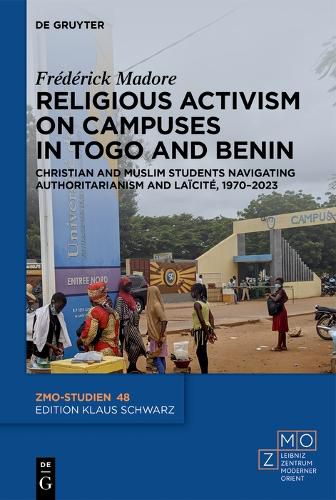Readings Newsletter
Become a Readings Member to make your shopping experience even easier.
Sign in or sign up for free!
You’re not far away from qualifying for FREE standard shipping within Australia
You’ve qualified for FREE standard shipping within Australia
The cart is loading…






The interplay between religion and student activism at the universities of Abomey-Calavi (Benin) and Lome (Togo) has often been overlooked, although faith-based organisations and student unions have coexisted since the 1970s. Based on interviews with different generations of activists, this book uncovers the neglected history of Christian and Muslim student associations on these campuses, originally strongholds of leftist and secular ideologies. It analyses the emergence of these groups under a Marxist-Leninist regime in Benin and a one-party dictatorship in Togo, and explores the implications of growing religiosity for these public universities as secular institutions.
The history of these associations reveals the campus as a microcosm reflecting wider national socio-political life, while also highlighting the importance of translocal factors in shaping the internal dynamics of these groups. Amidst the massification of university enrolments and rising graduate unemployment, faith-based associations have come to provide more than religious guidance. Increasingly, they offer a "social curriculum", providing a space for socialisation and a set of skills, norms and moral values that complement the secular academic curriculum.
$9.00 standard shipping within Australia
FREE standard shipping within Australia for orders over $100.00
Express & International shipping calculated at checkout
The interplay between religion and student activism at the universities of Abomey-Calavi (Benin) and Lome (Togo) has often been overlooked, although faith-based organisations and student unions have coexisted since the 1970s. Based on interviews with different generations of activists, this book uncovers the neglected history of Christian and Muslim student associations on these campuses, originally strongholds of leftist and secular ideologies. It analyses the emergence of these groups under a Marxist-Leninist regime in Benin and a one-party dictatorship in Togo, and explores the implications of growing religiosity for these public universities as secular institutions.
The history of these associations reveals the campus as a microcosm reflecting wider national socio-political life, while also highlighting the importance of translocal factors in shaping the internal dynamics of these groups. Amidst the massification of university enrolments and rising graduate unemployment, faith-based associations have come to provide more than religious guidance. Increasingly, they offer a "social curriculum", providing a space for socialisation and a set of skills, norms and moral values that complement the secular academic curriculum.